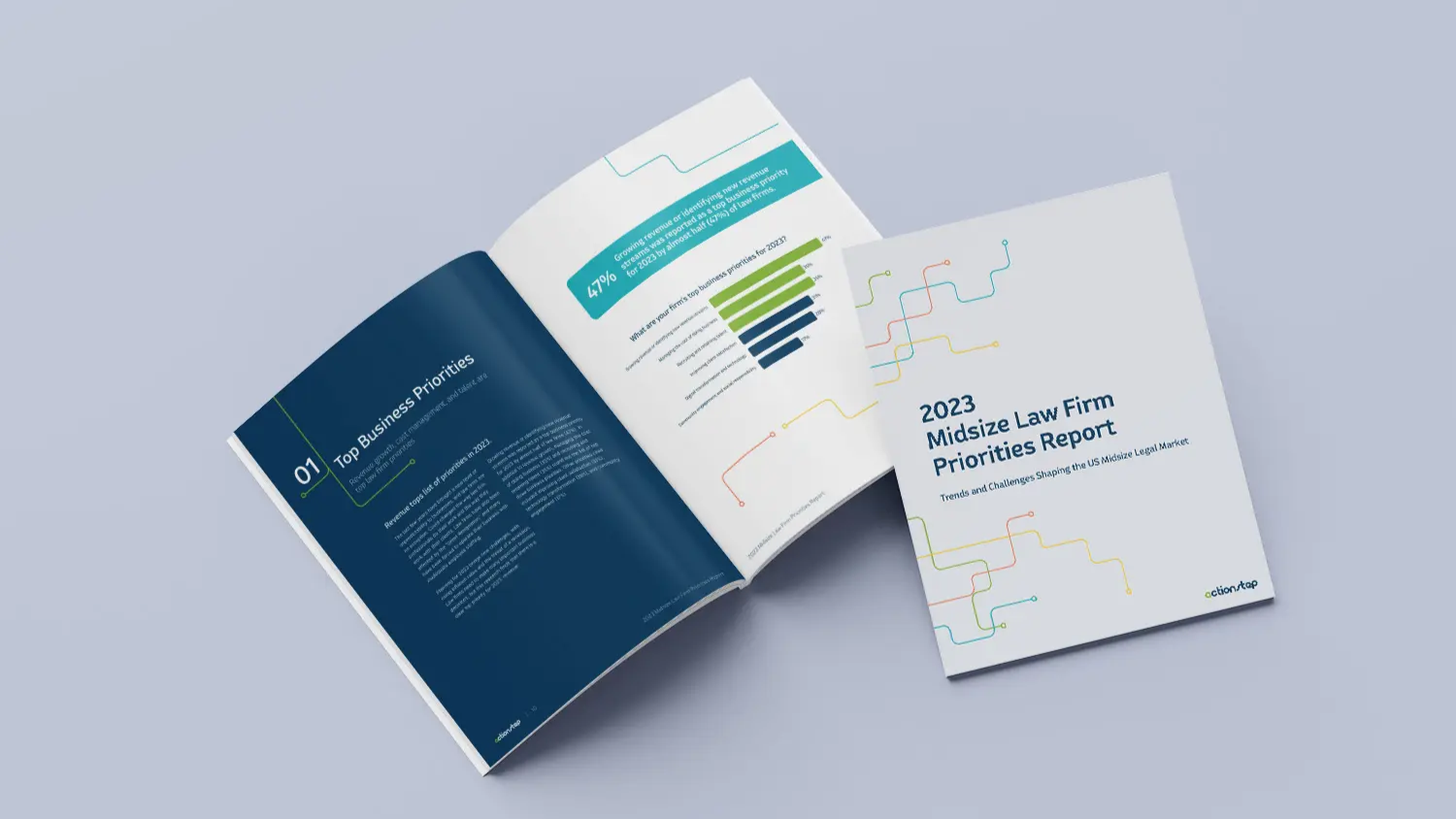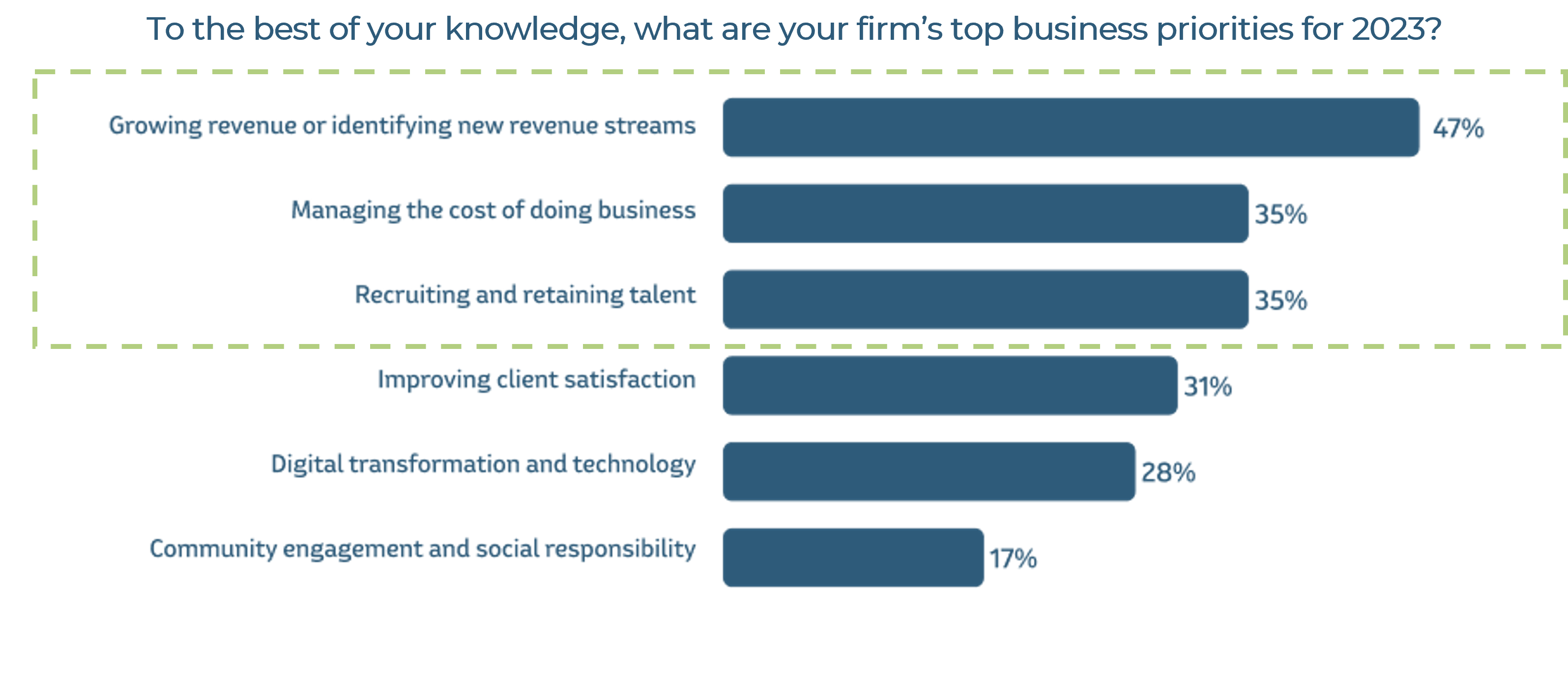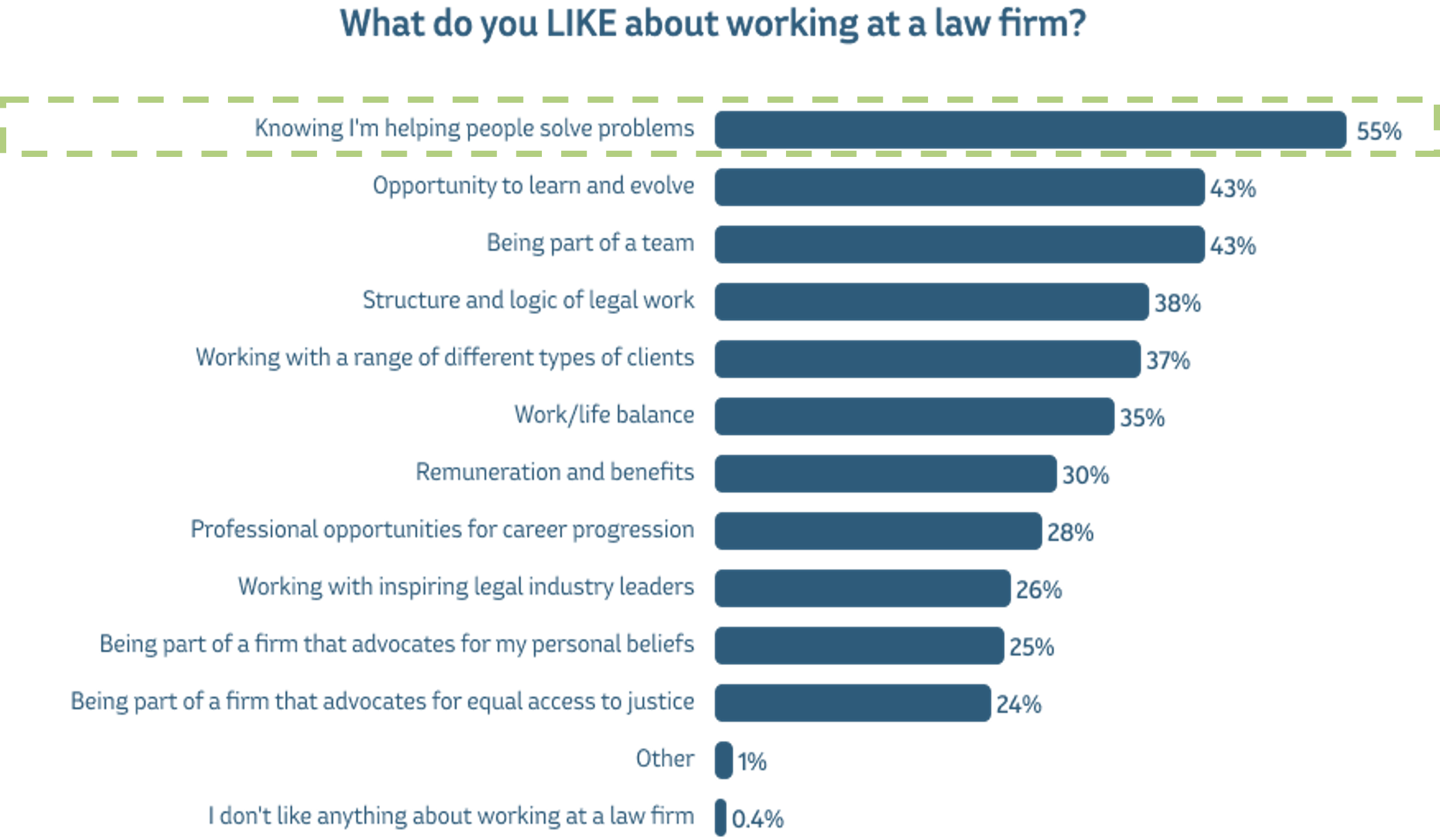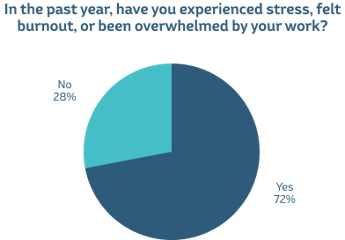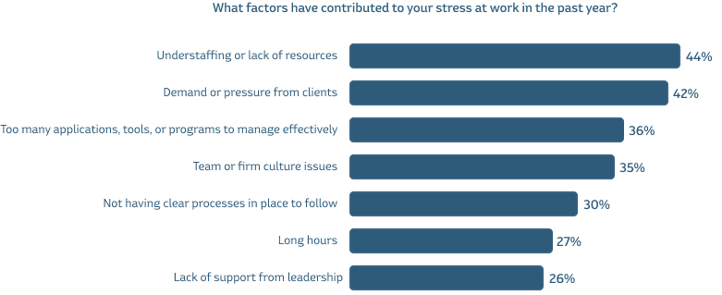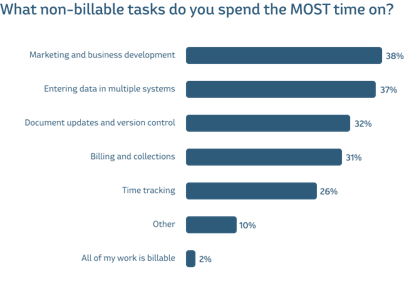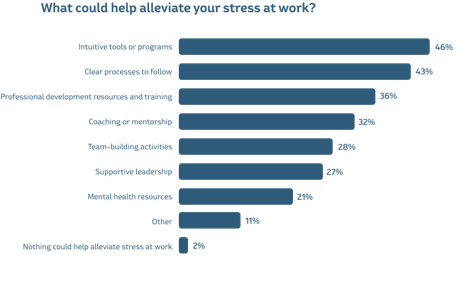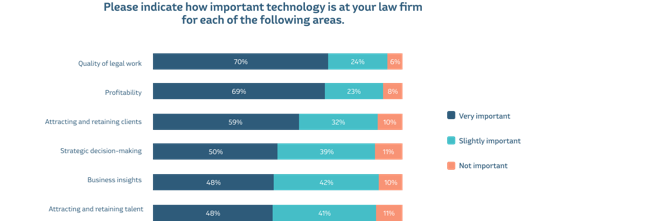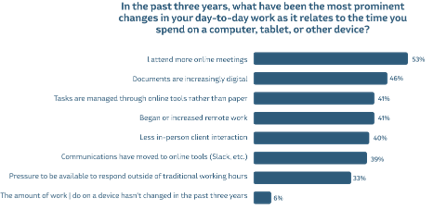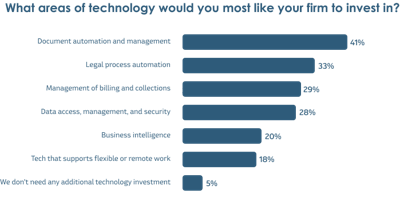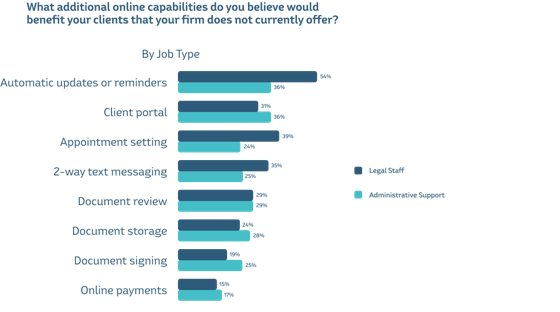A survey out today of lawyers, paralegals and administrative support professionals at midsized law firms finds that nearly three-quarters report feeling stress, burnout, or being overwhelmed in the past year, and that understaffing is a leading cause, with 92% saying their firms have been impacted by staffing or resources shortages.
Of the lawyers and paralegals who responded to the survey, the greatest sources of their stress are understaffing and client demands. For administrative support staff, the greatest sources of stress are team or cultural issues and lack of support from management.
But even though many of these legal professionals are feeling stressed, they overwhelmingly agree that technology can help their firms adapt and is critical to the satisfaction of their firms’ clients.
And, despite the stress, almost all professionals at midsized firms (99.6%) say they like at least some aspects of their work.
These are among the findings of the inaugural Midsize Law Firm Priorities Report, based on a survey conducted in December of 242 legal and administrative professionals who work in midsized law firms. The survey was commissioned by Actionstep, a company that provides law practice management software for midsized firms, and conducted by the technology market research company Dimensional Research.
Learn more about Actionstep at the LawNext Legal Technology Directory.
Of the professionals who responded to the survey, 50% percent were at firms of 20-100 employees, 40% were at firms of 10-20 employees, and 10% were at firms of more than 100 employees.
The survey included both legal staff, meaning lawyers and paralegals, and administrative staff, which included practice managers, firm administrators, IT, finance, operations, HR and other support functions.
Law Firm Priorities
The survey began by asking legal professionals what they understood to be their firms’ top priorities for 2023. Their answers revealed that, at the top of the list are growing revenue, managing costs, and recruiting and retaining talent.
Other priorities include improving client satisfaction, digital transformation and technology, and community engagement and social responsibility.
Job Satisfaction
With regard to their job satisfaction, virtually every professional who responded to the survey reported that they like aspects of working at a firm. When asked more specifically what they like about their job, the most frequent answer (55%) was that they like knowing they are helping people with their problems.
On the flip side, what legal professionals most dislike about their jobs is having to perform administrative tasks that divert them from more skilled work.
Interestingly, legal professionals at firms that have documented client-service expectations are more likely to be satisfied in their jobs, suggesting a correlation between documenting client expectations and employee satisfaction.
High Levels of Stress
The survey found that stress is an issue that plagues midsized law firms. In fact, almost three-quarters of legal professionals (72%) said that they have experienced stress, felt burnout, or been overwhelmed by work in the past year.
However, law firm professionals who worked remotely more than a quarter of their time were less likely to report stress and burnout. The survey found that 55% of law firm professionals fell into this remote work category, and that only 64% of them felt stress and burnout, compared to 82% of employees who rarely worked remotely.
When asked about the specific causes of stress and burnout, the most common causes were understaffing and lack of resources and demands from clients.
The third most-common cause was what is often described as “platform fatigue” – too many applications, tools or programs to manage effectively.
Among administrative staff, understaffing has exacerbated stress in multiple ways, including:
- Individuals having to cover multiple roles.
- Errors or tasks falling through the cracks.
- Having to work longer hours.
- Inability to implement changes or innovations.
- Having to turn away work.
Another cause of stress, the survey found, is having to spend time on non-billable tasks, with the most common being marketing and business development, following by having to enter data in multiple systems.
Over half of law firm professionals feel they spend a disproportionate amount of time on non-billable tasks.
Even as law firm professionals are feeling stress, nearly all have clear ideas of what their firms could do to alleviate stress. These range from providing better technology tools to setting clear processes to follow, to providing better coaching and mentorship.
Another cause of stress is unhappy clients, and the survey indicates that understaffing directly contributes to client dissatisfaction by causing mistakes, poor communication, missed deadlines, and inconsistent workflows.
Different Roles, Different Needs
Even though both legal and administrative staff report stress and burnout, there is no one-size-fits-all approach to addressing their needs, the survey finds. Different factors contribute to their stress and different solutions can help alleviate their stress.
“Legal staff are much more likely to say they are affected by understaffing or lack of resources (54% vs. 35%) and demand or pressure from clients (52% vs. 34%) than administrative support roles,” the survey finds. “Conversely, administrative roles are more likely to say they are stressed by team or firm culture issues (42% vs. 27%), not having clear processes in place to follow (34% vs. 26%), and a lack of support from leadership (29% vs. 21%) compared to their counterparts in legal roles.”
Even when it comes to what they like or dislike about working at a firm, legal and administrative staff have different perspectives. For both legal and administrative staff, what they most like is knowing they are helping people solve problems, but while 69% of legal staff say this, only 44% of administrative staff do.
On the flip side, both groups agree that what they most dislike is having to perform administrative tasks that divert them from more skilled work, but while 50% of legal staff cite this, only 29% of administrative staff do.
Legal and administrative staff also have slightly different views on their firms’ top business priorities. More legal professionals (55%) see growing revenue as a top priority than do administrative staff (40%), while more administrative staff (37%) see managing the cost of doing business as a top priority than do legal staff (33%).
Technology Can Help
If understaffing and lack of resources are the problem, then it is little surprise that technology is part of the solution. In fact, 91% of respondents agreed with the statement, “Great law firm technology is critical for client satisfaction.”
More specifically, 70% of respondents said that technology is very important to the quality of the the firm’s legal work and a nearly equal number said it is very important to the firm’s profitability.
The survey offers insights into both how technology use has changed over the past three years and the areas of technology professionals would most like their firms to invest in more heavily.
Asked about the most prominent technology changes in their day-to-day work over the past three years, respondents said:
- They attend more online meetings.
- Documents are increasingly digital.
- Tasks are managed through online tools rather than paper.
Asked what areas of technology they most want their firms to invest in, they listed:
- Documentation automation and management.
- Legal process automation.
- Management of billing and collections.
All of this has led a majority of firms to invest more heavily in tech, the survey finds. Sixty percent of firms invested more heavily in tech over the past year, while 18% invested less in tech.
What motivated firms to invest in tech? The greatest factor was being able to access client files from anywhere. Other factors included:
- Automating manual administrative processes.
- Consistent quality of work.
- Reducing overall costs.
- Consolidation of data in one system.
- Data security.
Almost all law firms agree that their firm’s clients would benefit from additional online capabilities. That said, almost all firms already offer some kind of online capabilities, with the most common being online payments, following by document signing and client portals.
When asked what additional capabilities would benefit clients that their firms do not currently offer, the most frequent answer was automatic updates or reminders, followed by client portals, appointment setting, and two-way text messaging.
The vast majority agree that they could scale their businesses if clients could do more online by enabling firms to do more and be more efficient.
Takeaways for Law Firms
What are the lessons that law firms can extract from these findings? The survey’s authors suggest four key takeaways:
- Technology can help, but law firms need to evaluate their tech ecosystems to eliminate disjointed systems and integrate applications within a cohesive cloud-based platform.
- Automation of workflows can help reduce time spent on tasks, especially in areas such as document creation, routing, calendaring, invoicing, and matter management.
- Flexibility in allowing remote work can have a positive impact on employee morale and productivity.
- Firms should position themselves to be ready to grow and evolve, and technology is a key factor in enabling that.
The full report contains many more details than I have reported here. You can download the full report here: 2023 Midsize Law Firm Priorities Report.
 Robert Ambrogi Blog
Robert Ambrogi Blog